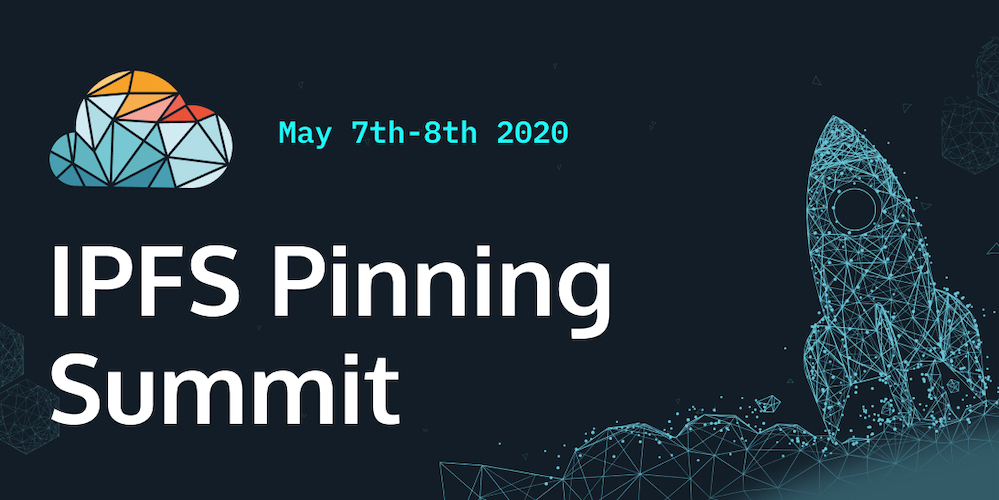
The first-ever IPFS Pinning Summit (opens new window) brought together IPFS pinning services (opens new window), infra providers, and users for 2 days of presentations & meetings to discuss the current state of IPFS infrastructure, services, and tools - and the future opportunities in this space.
Day 1 focused on the accelerating growth of the IPFS ecosystem - especially the adoption and improvement of IPFS tooling and support for verticals like Web3 applications, DevOps pipelines, and Large Data on IPFS. The day also included presentations from major IPFS pinning services like Infura (opens new window) and Pinata (opens new window), tools smoothing the IPFS upgrade UX like Fleek (opens new window) and UnstoppableDomains (opens new window), and applications building on top of IPFS with strong use cases for IPFS infrastructure and tooling like Ceramic (opens new window), Ucam (opens new window), and Filecoin (opens new window).
IPFS Project Lead Molly Mackinlay (opens new window) called the next 18 months a “critical period” for the IPFS community. “There are lots of key applications and projects being built, improving the ecosystem, and all kinds of developer tools are arriving that are transforming how applications and users of IPFS end up using the system,” Mackinlay said. “All of these developer tools and systems are changing the nature of how people store and move data.”
The Summit also welcomed a host of IPFS collaborators to the stage, who demoed their work and shared tips on running dweb infrastructure and techniques for improving these services. Here are a few ecosystem highlights:
- Textile’s (opens new window) Andrew Hill and Aaron Sutula debuted Powergate (opens new window), an API-driven solution for deploying multitiered storage across Filecoin and IPFS. Powergate gives clients easier access to control who and where their data is stored. Hill also detailed Textile’s ThreadsDB and Buckets, technologies that get us closer to a more intuitive object storage experience. Combining these tools with IPFS enables new pinning capabilities that support dynamic datasets and IPNS addresses. Watch both videos: on Powergate (opens new window) and on ThreadsDB & Buckets (opens new window).
- Infura’s (opens new window) Mike Godsey walked through the history and role of IPFS in Infura’s Web3 dev suite. Infura is leading the charge on permissioned gateways. Godsey also hinted at what’s next for Infura when it comes to building on the Filecoin network. “We are actively in discussions with the PL team about all of the interesting ways we can utilize Filecoin inside our infrastructure. We’re exploring specific Filecoin functionality that would be separate from our IPFS functionality. This is still in progress, but it’s super important to us.” Watch the video (opens new window).
- Brett Shear, co-founder and COO of Fleek (opens new window), showcased how to use Fleek's new IPFS/S3 product to upload, pin, and fetch files to/from IPFS at lightning speed. Watch Shear’s presentation (opens new window).
- IoTeX (opens new window) Co-founder Raullen Chai talked about how IoTeX, a blockchain solution for powering the Internet of Things, is teaming up with IPFS to create decentralized privacy and user data ownership with home security camera Ucam. Watch the video (opens new window).
- Pinata (opens new window) CEO Kyle Tut dove deep into data permanence and discussed how to keep the data behind a CID alive. Likening data preservation to the responsibility artists have to maintain their own work, Tut asked “Is Da Vinci responsible for maintaining the Mona Lisa? And the answer to that is, no! Da Vinci is no longer with us, the painting is something like over 500 years old, and the person or the body that takes care of that painting today is the Louvre Museum.” Similarly, ownership of digital data, Tut argued, can transfer as a token, from one wallet to another. It’s the file owner’s responsibility to pin that data on a network like IPFS to make sure it’s secure. Watch the video (opens new window).
Day 2 focused on the future - with Juan Benet, creator of IPFS & Filecoin, highlighting new opportunities and improvements coming to the space, including a unified IPFS Pinning API, deeper integration of network services into IPFS tools like IPFS-Desktop (opens new window) and WebUI (opens new window), and new capabilities like Powergate (opens new window) to bring Filecoin persistence to IPFS pinning services.
The IPFS Pinning Summit brought together 100+ participants for product demos, deep-dives into ecosystem progress, and lightning talks on new tools. Talks dived into how infra providers could tune their services to enhance growing verticals like video, gaming, or browsers - or how they might offer new, specialized products for private networks, access control layers, or network introspection.
Presentations also explored new opportunities related to the upcoming Filecoin Network launch - which adds an incentive layer to distributed data storage in IPFS. Filecoin Leads Pooja Shah and Juan Benet shared a number of new ways to integrate Filecoin (opens new window) to augment and enhance existing web3 infrastructure - like using Textile's Powergate to create Filecoin-backed IPFS Pinning Services.
Watch all of the sessions here (opens new window), including lightning talks on Filecoin’s GUI (opens new window), Git on Threads (opens new window), the Filecoin Discover Project (opens new window), and many more.
Thanks for an amazing summit, and looking forward to the next wave of adoption and growth we create together! 🚀
